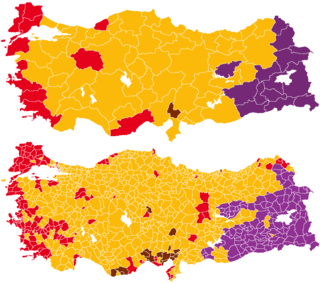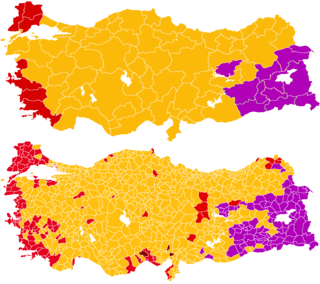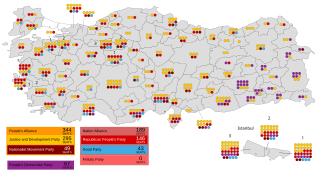
The Felicity Party is an Islamist Turkish political party. It was founded in 2001, and mainly supported by conservative Muslims in Turkey.

Elections in Turkey are held for six functions of government: presidential elections (national), parliamentary elections (national), municipality mayors (local), district mayors (local), provincial or municipal council members (local) and muhtars (local). Apart from elections, referendums are also held occasionally.

General elections were held in Turkey on 22 July 2007 to elect 550 members to the Grand National Assembly. Originally scheduled for November, the elections were brought forward after parliament failed to elect a new president to replace Ahmet Necdet Sezer. The result was a resounding victory for the incumbent Justice and Development Party (AKP), which won 46.6% of the vote and 341 seats. The party's leader Recep Tayyip Erdoğan was consequently re-elected as Prime Minister of Turkey. The opposition Republican People's Party (CHP) came second with 20.9% of the vote and took 112 seats. The Nationalist Movement Party (MHP), which had failed to surpass the 10% election threshold in the 2002 election, re-entered parliament with 14.3% of the vote and 71 MPs. The election was fought mostly on Turkey's debate over laïcité that had been perceived to be under threat from the AKP's nomination of Foreign Minister Abdullah Gül, an Islamist politician, for the Presidency. Developments in Iraq, secular and religious concerns, the intervention of the military in political issues, European Union membership negotiations, the United States and the Muslim world were other main issues.

Local elections were held in Turkey on 29 March 2009. The overall winner was the ruling party Justice and Development Party, although the party saw a decline in its vote relative to the 2007 general election. The leading opposition party, the social democratic Kemalist CHP, increased its vote share, as did a number of smaller parties including the SP, DTP and BBP, whose party leader Muhsin Yazıcıoğlu had died in a helicopter crash four days before the election. The third largest party, the Turkish nationalist MHP, enjoyed a more modest vote surge. The election was not contested by Cem Uzan's GP. The AKP failed to take certain provinces it had publicly targeted, such as Diyarbakır, İzmir and Urfa, and did not achieve its goal of exceeding 47% of the overall vote. There was localized election-related fighting in southeastern Turkey, in which five people were reported to have been killed and about a hundred injured.

Meral Akşener is a Turkish politician, teacher, historian and academic who is the founder of the Good Party.

The Turkish local elections of 2004 were held throughout the eighty-one Provinces of Turkey on 28 March 2004 in order to elect both mayors and councillors to local government positions. All 16 metropolitan and 3,193 district municipalities were up for election, while 3,208 provincial and 34,477 municipal councillors were also elected. More than 50,000 neighbourhood presidents (muhtars) were also elected, though these do not have any political affiliations.

Presidential elections were held in Turkey on 10 August 2014 in order to elect the 12th President. Prime Minister Recep Tayyip Erdoğan was elected outright with an absolute majority of the vote in the first round, making a scheduled run-off for 24 August unnecessary.

General elections were held in Turkey on 7 June 2015 to elect 550 members to the Grand National Assembly. This was the 24th general election in the history of the Turkish Republic, electing the country's 25th Parliament. The result was the first hung parliament since the 1999 general elections. Unsuccessful attempts to form a coalition government resulted in a snap general election being called for November 2015.
In the run-up to the Turkish general election of June 2015, many political parties engaged in campaign efforts to increase their vote shares. The main contesting parties were the governing incumbent Justice and Development Party (AKP) led by Ahmet Davutoğlu, the Republican People's Party (CHP) led by Kemal Kılıçdaroğlu, the Nationalist Movement Party (MHP) led by Devlet Bahçeli and the Peoples' Democratic Party (HDP) co-led by Selahattin Demirtaş and Figen Yüksekdağ. These four parties are the only parties with a realistic chance of surpassing the 10% parliamentary threshold to gain representation in the Grand National Assembly of Turkey
The electoral system of Turkey varies for general, presidential and local elections that take place in Turkey every five years. Turkey has been a multi-party democracy since 1950, with the first democratic election held on 14 May 1950 leading to the end of the single-party rule established in 1923. The current electoral system for electing Members of Parliament to the Grand National Assembly has a 7% election threshold.

General elections were held in Turkey on 1 November 2015 to elect 550 members to the Grand National Assembly. They were the 25th general elections in the History of the Republic of Turkey and elected the country's 26th Parliament. The election resulted in the Justice and Development Party (AKP) regaining a parliamentary majority following a 'shock' victory, having lost it five months earlier in the June 2015 general elections.

The Republican People's Party election campaign of June 2015 was the election campaign of the Republican People's Party (CHP), the main opposition political party in Turkey. The campaign, which was mainly centred on the slogan Yaşanacak Bir Türkiye, was for the June 2015 general election. Before the election, the CHP had signed a deal with the American election strategy firm Beneson Strategy Group to assist with the campaign.

Parliamentary elections were held in Turkey on 14 May 2023, alongside presidential elections, to elect all 600 members of the Grand National Assembly. The incoming members formed the 28th Parliament of Turkey. The elections had originally been scheduled to take place on June 18, but the government moved them forward by a month to avoid coinciding with the university exams, the Hajj pilgrimage and the start of the summer holidays. Prior to the election, the electoral threshold for a party to enter parliament was lowered from 10% to 7% by the ruling party.

The Turkish local elections of 2019 were held on Sunday 31 March 2019 throughout the 81 provinces of Turkey. A total of 30 metropolitan and 1,351 district municipal mayors, alongside 1,251 provincial and 20,500 municipal councillors were elected, in addition to numerous local non-partisan positions such as neighbourhood representatives (muhtars) and elderly people's councils.
The People's Alliance, abbreviated as PEOPLE, is an electoral alliance in Turkey, established in February 2018 between the ruling Justice and Development Party and the formerly opposition Nationalist Movement Party (MHP). The alliance was formed to contest the 2018 general election, and brings together the political parties supporting the re-election of President Recep Tayyip Erdoğan. Its main rival is the Nation Alliance, which was originally created by four opposition parties in 2018 and was re-established in 2019.

Presidential elections were held in Turkey on 24 June 2018 as part of the 2018 general election, alongside parliamentary elections on the same day. They were the first presidential elections held after constitutional amendments were approved in a 2017 referendum.

Parliamentary elections were held in Turkey on 24 June 2018 as part of general elections, with presidential elections taking place on the same day. Originally scheduled for 27 October 2019, President Recep Tayyip Erdoğan called snap elections on 18 April after months of speculation. With the passage of a series of constitutional amendments in the 2017 referendum, the number of MPs will be increased from the previous 550 to 600. These representatives will be elected by the constituents of the 87 electoral districts of Turkey by party-list proportional representation.
The Nation Alliance, abbreviated as NATION, was an electoral and political alliance in Turkey, made up of six opposition parties to contest the 2023 Turkish general election against its main rival, the People's Alliance. Originally established prior to the country's 2018 general election, the alliance had consisted of four opposition parties across the political spectrum, which had found common ground on withstanding Turkey's newly established presidential system. The alliance dissolved in 1 June 2023 following its narrow defeat in the 2023 elections, after the Good Party's announcement that they were no longer a part of it.
Multiple political parties in Turkey underwent candidate selection processes in the run-up to the 2018 presidential election. Parties represented in the Grand National Assembly were able to field candidates directly by collecting signatures from at least 20 of their Members of Parliament, as were parties who had no representation but won more than 5% in the previous general election. Candidates that did not meet either criterion were required to obtain over 100,000 signatures from Turkish citizens between 4 and 9 May.
The Justice Party is a liberal conservative political party in Turkey. The party is situated on the centre-right of the political spectrum, and considers itself a successor to the historical Justice Party of Süleyman Demirel, active from 1961 to 1981. The modern incarnation of the party was established on 9 October 2015 by Vecdet Öz, a former member of the centre-left Republican People's Party.






















